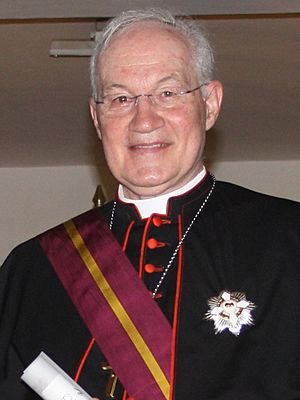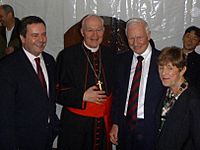Marc Ouellet facts for kids
Quick facts for kids His Eminence Marc Ouellet PSS |
|
|---|---|
|
|

Ouellet in 2012
|
|
| Appointed | 30 June 2010 |
| Reign ended | 30 January 2023 |
| Predecessor | Giovanni Battista Re |
| Successor | Robert Francis Prevost |
| Other posts |
|
| Orders | |
| Ordination | 25 May 1968 |
| Consecration | 19 March 2001 by Pope John Paul II |
| Created Cardinal | 21 October 2003 |
| Rank | Cardinal Bishop |
| Personal details | |
| Birth name | Marc Armand Ouellet |
| Born | 8 June 1944 La Motte, Quebec, Canada |
| Denomination | Roman Catholic |
| Parents | Pierre Ouellet and Graziella Michaud |
| Previous post |
|
| Motto | Ut unum sint (That they may be one) |
| Coat of arms |  |
Marc Armand Ouellet (born June 8, 1944) is a Canadian cardinal in the Catholic Church. For many years, he held important leadership roles in the Vatican. From 2010 to 2023, he was in charge of the Dicastery for Bishops, an office that helps the Pope choose new bishops around the world. He is a member of a group of priests called the Sulpicians.
Before his work in Rome, Cardinal Ouellet was the Archbishop of Quebec from 2003 to 2010. This role also made him the Primate of Canada, a title of honor. Pope John Paul II made him a cardinal in 2003. Because of his high rank, he was seen as a possible person to be elected pope in both the 2005 and 2013 elections.
He began his career as a priest in 1968. For many years, he studied and taught theology, which is the study of God and religious faith. He worked as a teacher and leader at schools for priests, called seminaries, in Canada, Colombia, and Rome.
Contents
Early Life and Education
Marc Ouellet was born on June 8, 1944, in La Motte, a small village in Quebec, Canada. He grew up in a Catholic family with seven siblings. His father, Pierre, was a farmer who later became the head of the local school board. His family went to church regularly.
As a child, Marc enjoyed reading, playing ice hockey, and spending time outdoors. When he was 17, he had a hockey injury. While he was recovering, he read a book about Saint Thérèse of Lisieux that made him think deeply about his faith. Soon after, he decided he wanted to become a priest.
He studied at the Major Seminary of Montreal and was ordained a priest on May 25, 1968. He then worked at a church in Val-d'Or, Quebec.
A Career of Teaching and Study
For many years, Father Ouellet's career involved both teaching and continuing his own education. He taught philosophy at a seminary in Bogotá, Colombia. In 1972, he officially joined the Sulpicians, a society of priests dedicated to training future priests.
He went to Rome to study and earned a degree in philosophy in 1974. He then returned to Colombia to teach. Later, he taught at a seminary in Montreal. He went back to Rome again to study dogmatic theology (the core beliefs of the Church) and earned his doctorate in 1983.
After finishing his studies, he held leadership positions at seminaries in Colombia, Montreal, and Edmonton. From 1996 to 2002, he taught at a special institute in Rome focused on marriage and family studies.
Becoming a Bishop and Archbishop
In 2001, Pope John Paul II chose Ouellet to become a bishop. He was appointed as the secretary of the Pontifical Council for Promoting Christian Unity, an office that works on building relationships with other Christian churches. The Pope himself consecrated him as a bishop on March 19, 2001.
On November 15, 2002, Pope John Paul II appointed him as the Archbishop of Quebec. As archbishop, he became an important voice for the Catholic Church in Canada. He often spoke about public issues from a faith perspective. For example, he encouraged political leaders to support the traditional definition of marriage.
In 2007, he wrote a public letter apologizing for past mistakes made by the Church in Quebec. He mentioned issues like discrimination and not showing enough respect to First Nations peoples, women, and others. He also spoke about the importance of protecting life from its very beginning.
Work as a Cardinal

On October 21, 2003, Pope John Paul II made Archbishop Ouellet a cardinal. This is one of the highest ranks in the Catholic Church. Cardinals are special advisors to the Pope and are responsible for electing a new pope when one dies or resigns.
Cardinal Ouellet was a voter in the 2005 papal conclave that elected Pope Benedict XVI. He was also an elector in the 2013 conclave that elected Pope Francis. In both elections, he was considered a strong candidate for the papacy himself.
When asked about the possibility of becoming pope, he said it would be a "nightmare" because of the huge responsibility. He saw how hard Pope Benedict XVI worked and did not wish for the job.
Leadership in the Vatican
On June 30, 2010, Pope Benedict XVI appointed Cardinal Ouellet to two major positions in the Roman Curia, which is the government of the Catholic Church. He became the prefect of the Congregation for Bishops and president of the Pontifical Commission for Latin America.
As prefect, his main job was to help the Pope find and appoint new bishops all over the world. He said that the Church needed bishops who were great teachers of the faith, not just good managers. He believed bishops should be able to explain and defend their faith in public.
During his time in the Vatican, Pope Francis also appointed him as a member of several other important departments, including those for religious life and for priests. In 2018, Pope Francis promoted him to the rank of Cardinal Bishop, a title given to the most senior cardinals.
Cardinal Ouellet retired from his positions in the Vatican on January 30, 2023.
Personal Life
Cardinal Ouellet is known for his language skills. He can speak English, French, Spanish, Portuguese, Italian, and German.
Distinctions
- Holy See: Order of the Holy Sepulchre
See also
 In Spanish: Marc Ouellet para niños
In Spanish: Marc Ouellet para niños

